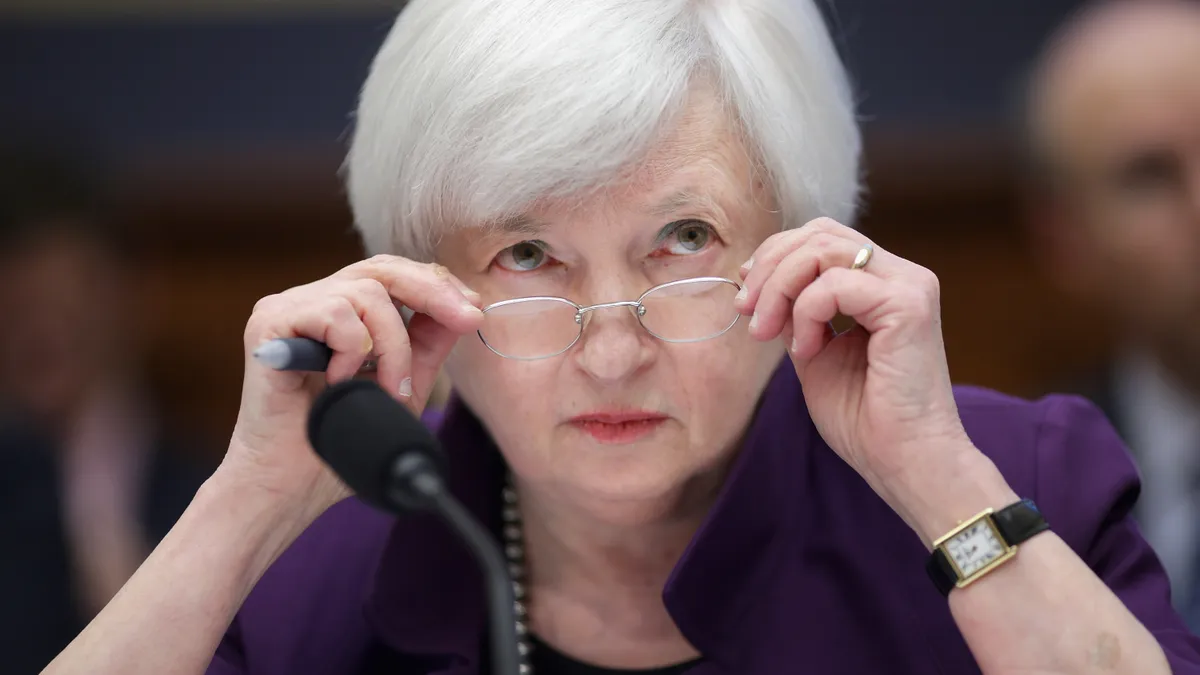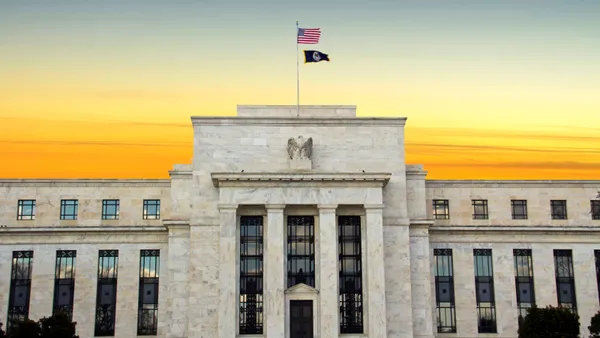Dive Brief:
- Regulators want to see more oversight of stablecoins, and have asked Congress to pass legislation that would require that issuers of the digital assets be insured depository institutions subject to the same regulations as traditional banks, according to a report issued Monday by the President’s Working Group on Financial Markets.
- Stablecoins, which are pegged to a fiat currency such as the U.S. dollar, offer many benefits, including the potential to support beneficial payments options, Treasury Secretary Janet Yellen said in a statement accompanying the report. "But the absence of appropriate oversight presents risks to users and the broader system," she said.
- The working group, which has been researching the benefits and risks associated with stablecoins for several months, consists of the U.S. Treasury, the Federal Reserve, the Securities and Exchange Commission and the Commodity Futures Trading Commission. The group also received input from the Federal Deposit Insurance Corp. and the Office of the Comptroller of the Currency.
Dive Insight:
Monday's report comes after a July meeting of the working group during which Yellen "underscored the need to act quickly to ensure there is an appropriate U.S. regulatory framework in place."
"Current oversight is inconsistent and fragmented, with some stablecoins effectively falling outside the regulatory perimeter," Yellen said in Monday's statement.
Stablecoins, which are issued by fintechs such as Tether and Circle, are used to facilitate trading of other digital assets, and are designed to withstand volatility, an issue that plagues many cryptocurrencies.
More than $130 billion worth of stablecoins are in circulation, up from $28 billion in January, according to The New York Times.
Monday's report, however, concludes stablecoins haven’t always been as secure as some issuers claim.
"The potential for the increased use of stablecoins as a means of payments raises a range of concerns, related to the potential for destabilizing runs, disruptions in the payment system, and concentration of economic power," the report said.
Tether, for example, has paid more than $60 million in penalties this year to settle allegations from both the New York attorney general and the CFTC that the company did not have sufficient reserves at all times to back up its stablecoins.
Tether and the Facebook-backed Diem were a major focus of the July working group meeting that, for about a week, had been shrouded in secrecy, Bloomberg reported.
The working group Monday recommended Congress enact legislation to ensure that payment stablecoins and payment stablecoin arrangements are subject to a federal framework "on a consistent and comprehensive basis."
"Such legislation would complement existing authorities with respect to market integrity, investor protection, and illicit finance," the agencies wrote.
Lawmakers respond
Senate Banking Chairman Sherrod Brown, D-OH, said the report highlights the risks that the rapid growth of stablecoins present to families and the economy.
"We must work to ensure that any new financial technologies are subject to all of the laws and regulations that protect investors, consumers, and markets, and that they compete on a level playing field with traditional financial institutions," he said in a statement Monday. "I look forward to working with Secretary Yellen and financial regulators to foster responsible innovation in the financial system."
Sen. Pat Toomey, R-PA, the ranking member on the committee, said "it is the responsibility of Congress to clarify whether, and to what extent, federal agencies have jurisdiction over stablecoins."
"While Congress works on thoughtful legislation, I hope the administration will resist the urge to stretch existing laws in an effort to expand its regulatory authority," he said, according to The Block.
Sen. Cynthia Lummis, R-WY, said she agreed with many of the report’s recommendations, including the need for congressional legislation, but called the proposal that only insured depository institutions may issue stablecoins "misguided and wrong."
"We should all be able to agree that startups should have the same chance as Wall Street institutions," she said in a statement, according to CNBC. "As the report clearly states, though, Congress will have the final say."
In preparation for the report, agency staff spoke to representatives from stablecoin issuers including Tether, Coinbase, Circle and the Diem Association.
Digital asset custody provider Anchorage and payment providers Visa, Mastercard, Square and Stripe also provided input, as did trade associations the Bank Policy Institute, the Independent Community Bankers of America and the National Association of Federally-Insured Credit Unions, among others.
In a statement to Banking Dive, Circle CEO Jeremy Allaire said his company fully supports the call for Congress to act and establish federal banking supervision for stablecoin issuance.
"The rapid scaling and strategic importance of this to dollar competitiveness in the age of crypto and blockchains is critical," he said. "This is huge progress in the acceptance of stablecoins and provides a path for their adoption as fundamental infrastructure for financial and economic activity in the coming decade."
In her statement, Yellen said Treasury and the agencies included in the working group "look forward to working with Members of Congress from both parties on this issue."
"While Congress considers action, regulators will continue to operate within their mandates to address the risks of these assets," she said.














